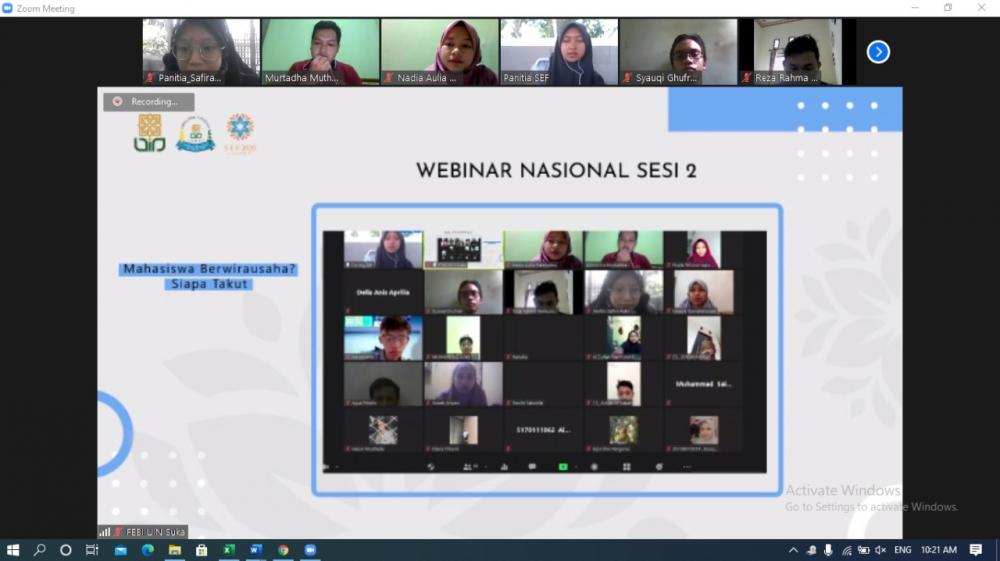WEBINAR SERIES 2: WHO’S AFRAID?

After the first implementation of the SEF (Shariah Economic Fair) 2020 webinar on Saturday, the second webinar event was held on Sunday, November 8, 2020, under the theme "student entrepreneurs: who’s afraid?". The event featured Murtadha Muthahhari as the speaker and was moderated by Nadia Aulia Rahmdea (a student of the Islamic Economics Study Program). The speaker is the owner of HAMMERCH (HAM Merchandise), the National Kopma Ambassador 2018, and the Chairman of Kopma UIN Sunan Kalijaga. Dr. Abdul Qoyyum, SEI, M.Sc.Fin, the Head of the Islamic Economics Study Program, delivered a welcome speech, highlighting that one of the profiles of Islamic Economics graduates is an entrepreneur possessing a deep understanding of business conditions and technological aspects. The second welcome speech was delivered by Dr. Ahmad Salehudin, S.Th.I, M.A., Vice Dean 3, stating that entrepreneurship aligns with the Sunnah of the Prophet Muhammad, who was also a trader in the past. Alhamdulillah, the event proceeded seamlessly, without encountering any significant obstacles, as it commenced with the recitation of the holy verses of the Quran by Yusuf Naufal and was skillfully guided through its progression by Yulita Bimantari.
The speaker initially discussed the concept of a student, defining them as individuals engaged in higher education. Emphasizing the moral dimension of their role, the speaker underscored the importance of moral responsibility in various aspects, including ethical business, environmental ethics, and the ethical conduct of entrepreneurs and consumers within the realm of entrepreneurship. Furthermore, the speaker highlighted the social and intellectual roles of students, emphasizing their obligation to consider and contribute to their organizational environment. The speaker also associated several terms with students, such as "agent of change," "iron stock," "moral force," and "social control." Additionally, the speaker outlined key exemplary traits that students should embody, including rationality, intelligence, idealism, innovation, critical thinking, creativity, revolutionism, intellectualism, and militancy.
The subsequent discussion focused on entrepreneurship. According to the Big Indonesian Dictionary, an entrepreneur is defined as an individual skilled in recognizing new products, devising innovative production methods, organizing operations for acquiring new products, marketing them, and managing their operational funding. When assuming the role of an entrepreneur, one becomes an innovator and inventor. Therefore, students with intellectual and entrepreneurial capabilities are encouraged to make innovative breakthroughs. The benefits of entrepreneurship include job creation, enhanced creativity, financial gains, and the development of leadership qualities. However, each advantage is accompanied by its own set of disadvantages. These disadvantages encompass the uncertainty of time, the risk of losing various investments, increased workloads, decision-making challenges, and the need to refine numerous skills. It is not surprising that many leaders were previously entrepreneurs, as their experiences in entrepreneurship have honed their decision-making abilities.
Students' involvement in entrepreneurship often stems from various backgrounds, such as the need to cover tuition fees, contribute to their family's financial well-being, or manage tertiary expenses. Several supporting factors, including available leisure time, the potential roles and advantages of students, the possibility of initiating businesses without initial capital, access to ample funding, and the context of Indonesia's economic situation, further contribute to students' interest in entrepreneurship. When students contemplate starting a business, conducting thorough research is essential to ensure its smooth operation, identify and address any shortcomings, and make necessary improvements. Overcoming the fear associated with entrepreneurship requires taking the initial step, as hesitancy can perpetuate apprehension. Prior calculations are crucial before embarking on an entrepreneurial endeavor to maintain a clear trajectory. Consequently, a balance between academic pursuits and entrepreneurial ventures must be struck, accompanied by a resolute determination to move forward despite any fears. Embracing the ethos of learning from mistakes, both one's own and those of others, is pivotal in entrepreneurship, as is the resilience to rise again after setbacks. This resilience embodies a fundamental principle of entrepreneurship.
Author: Hanifa Salsabilla
